
If you travel with a hygrometer, as any seasoned traveler should, what I have to show you here is nothing new. But if instead you’ve never measured the relative humidity in a hotel room, I’ve got something interesting for you today. And I also have an answer to the question you may not have known you had. Yes, hotels here in the eastern half of North America have a humidity problem. But how bad is it? And why does it happen?
This past summer I did a little book tour in the Northeast. I drove from my home in Atlanta all the way to Halifax, Nova Scotia and back, staying thirteen nights in eight hotels. I also spent four nights in a couple of Airbnbs and four nights with friends, but this article focuses just on the hotels. I carry my Aranet4 carbon dioxide monitor with me when I travel because it provides good information about ventilation. But it also measures temperature and relative humidity, my interest here.
Week 1: 4 sticky nights in 3 hotels
In my first week on the road, I stayed in hotels in West Virginia and New York. The first one was a cheap hotel. The other two were midscale to upper midscale. Here’s what the relative humidity looked like.
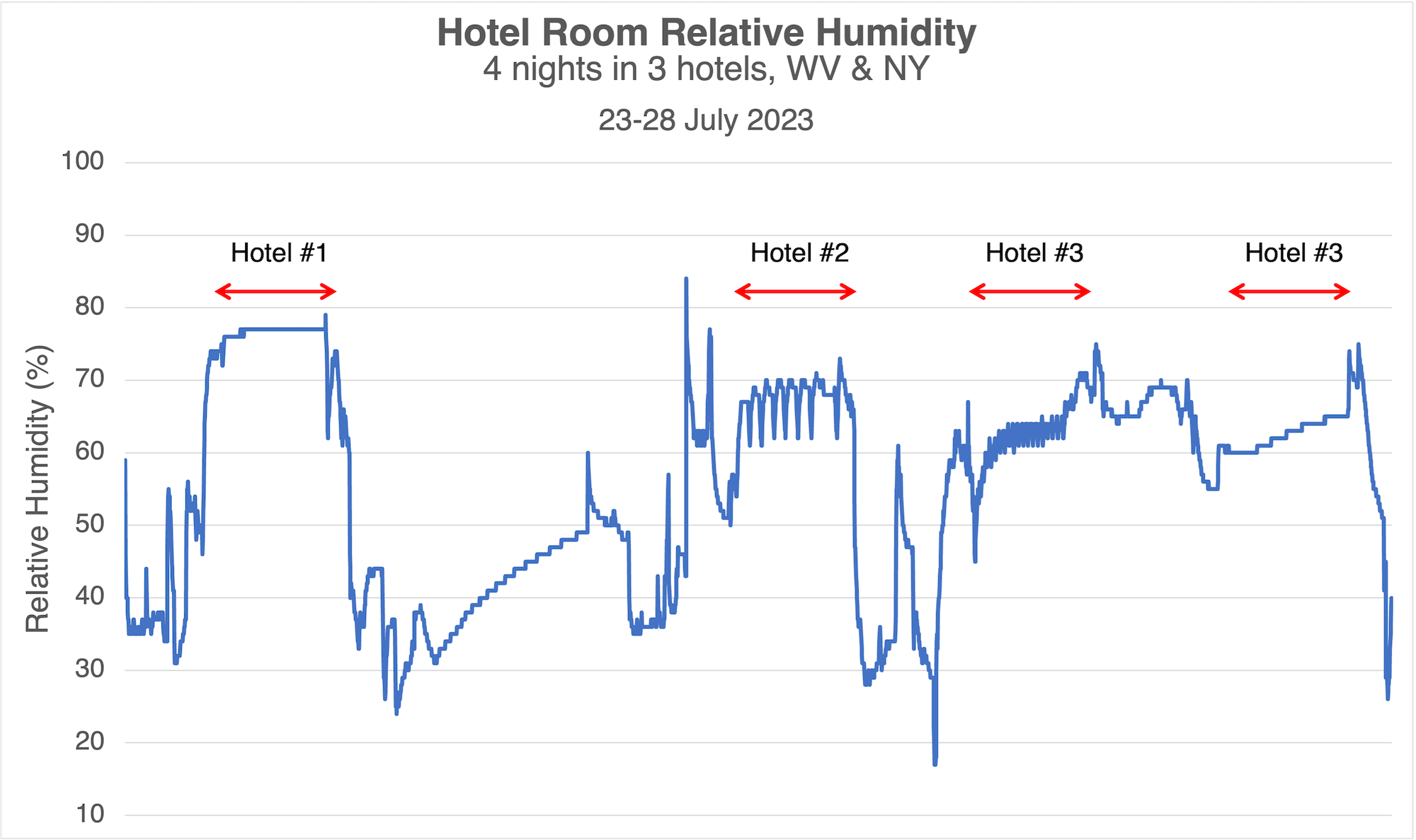
The cheap hotel (#1) was clearly the worst, hitting nearly 80 percent relative humidity. But spending more for lodging didn’t buy me much improvement. The second one still hit 70 percent, and the third one was above 60 percent both nights.
“But wait,” you say. “Aren’t you the guy who hates talking about relative humidity? Didn’t you say dew point temperature is better?”
Why, yes. I have said that. To explain, let’s start with the indoor design conditions from the Air Conditioning Contractors of America. At an indoor temperature of 75 °F and relative humidity of 50 percent, the dew point temperature is 55 °F. In the first three nights shown above, the room temperature was about 68 °F while I slept, and the dew point was in the 50s F. But I also had plenty of hours with the dew point in the 60s F.
On the last of those four nights, I kept the room at about 75 °F. That pushed the dew point up to as high as 67 °F. Not good.
Week 2: 5 nights in 1 stubborn hotel
The next graph shows the data from a single hotel where I spent five nights while at a conference in Massachusetts. You can see that the relative humidity climbed to 80 percent on the first day. The weather was warm and humid that day, and it rained in the evening.
But then the weather turned beautiful. The nighttime lows were in the mid-50s F with daytime highs in the mid-70s. The outdoor humidity was low the rest of my time there, with dew points in the low- to mid-50s.
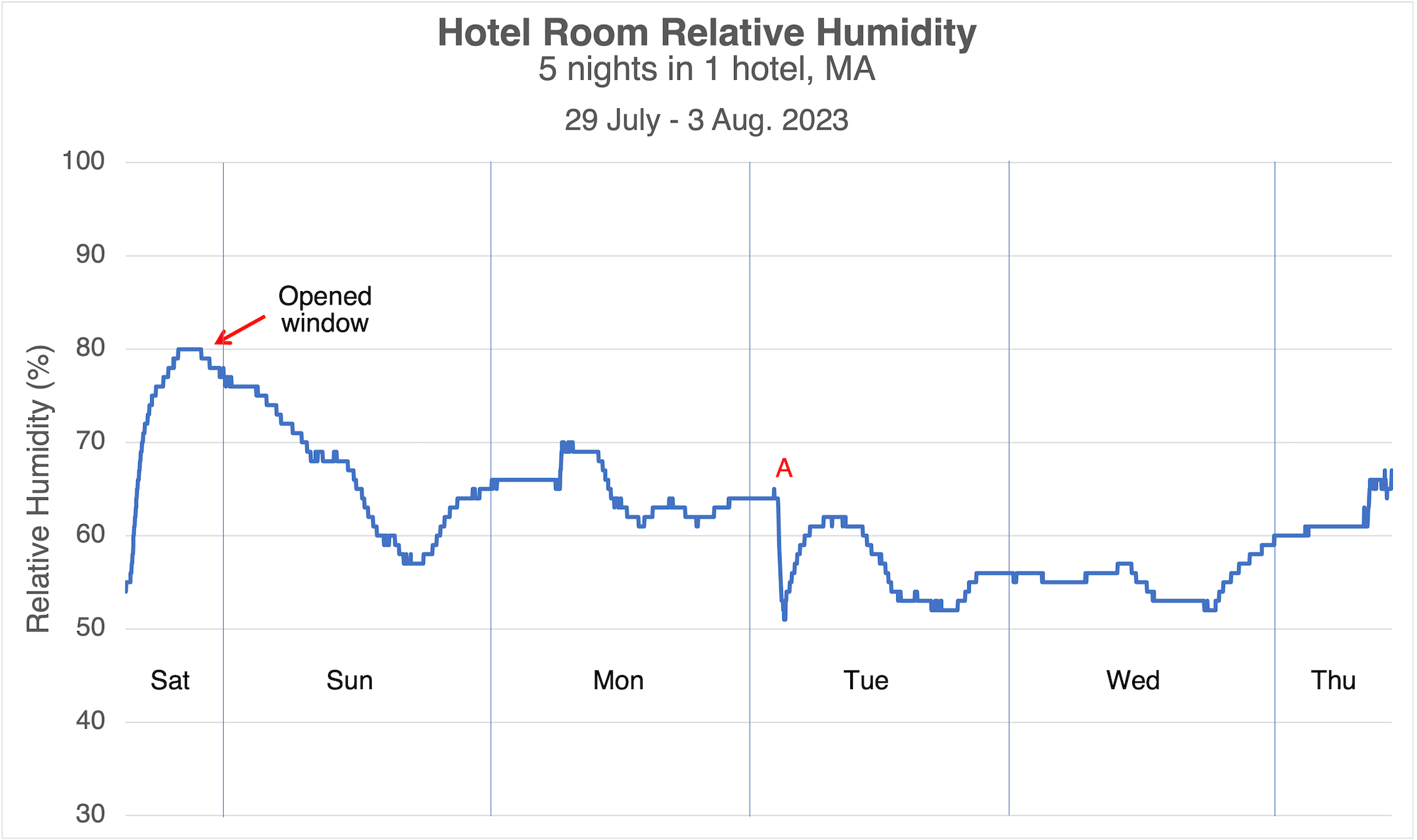
And lucky for me, I was on the second floor in a hotel that had operable windows. That Saturday night, after the cool, dry weather moved in, I opened my window. You can see that the relative humidity in my room fell through Sunday afternoon, even getting down to less than 60 percent. But then it rose and stayed in 60 to 70 percent range for the next day and a half.
Why? The outdoor air was dry. My window was open. I even opened the window at the end of the hall. Someone kept closing it, but I’d open it again when I walked down there. It’s an old building, and perhaps the rain had wet some of the materials, keeping things humid inside.
So what happened at point A? Well, when the afterparty in the hotel lobby ended at about 2 in the morning, I went back to my room. I opened the hall window again, and a strong breeze came in. That helped drop the humidity rapidly, but then either someone closed the window or turned off whatever fans were creating the negative pressure.
Finally, after nearly three days, my room dried out enough to stay below 60 percent relative humidity on Tuesday.
Last night: A little surprise
I’d gotten so used to seeing high relative humidity in hotel rooms on this trip that I expected the same on my last night. Instead, the relative humidity stayed in the low to mid 50s the whole night. The graph below shows those data.
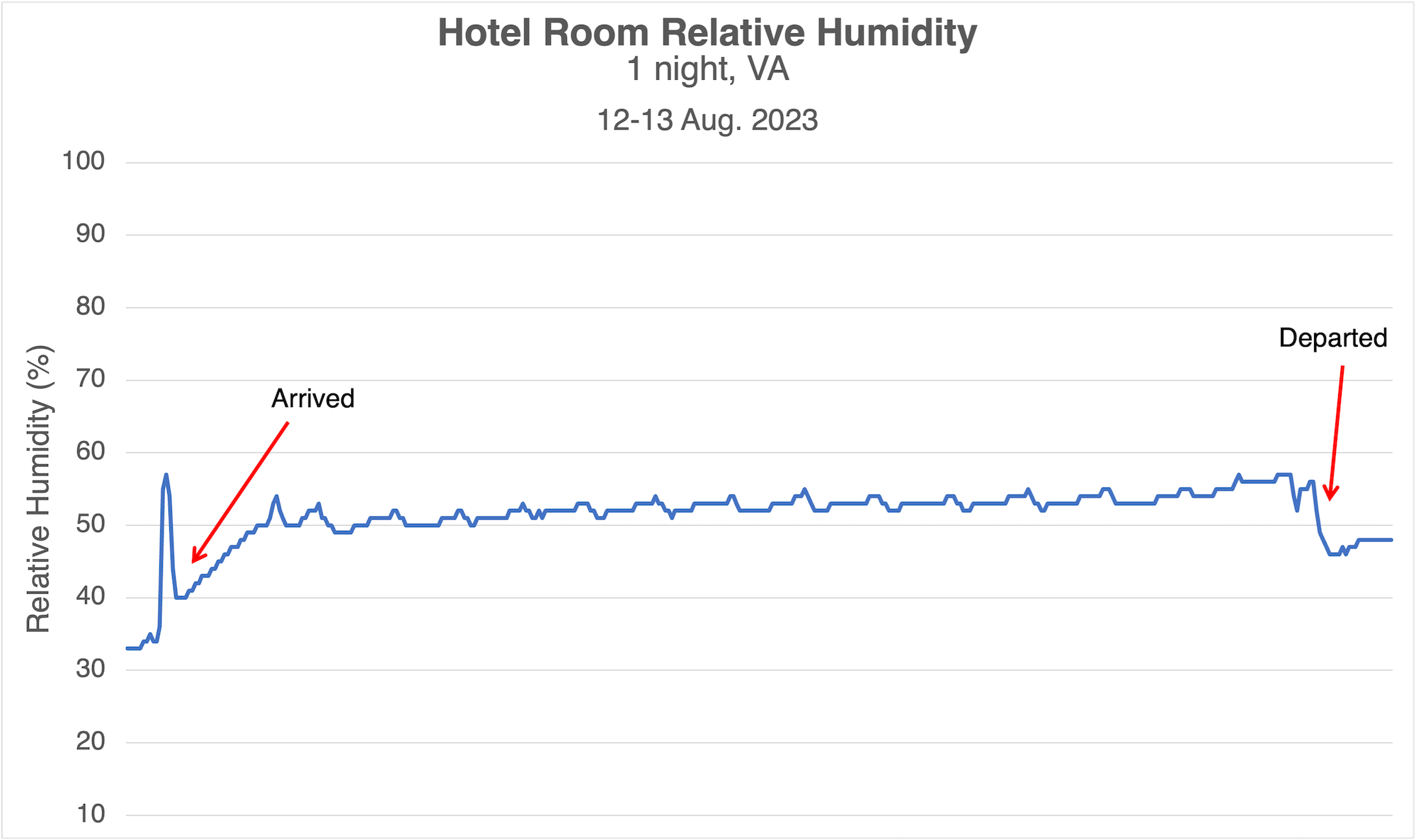
My first thought was that maybe the filters were dirty. That could help reduce the humidity level because it would reduce the airflow across the air conditioner coil. Lower airflow means lower coil temperature and better dehumidification. So I checked them. As you can see in the photo below, they were clean.
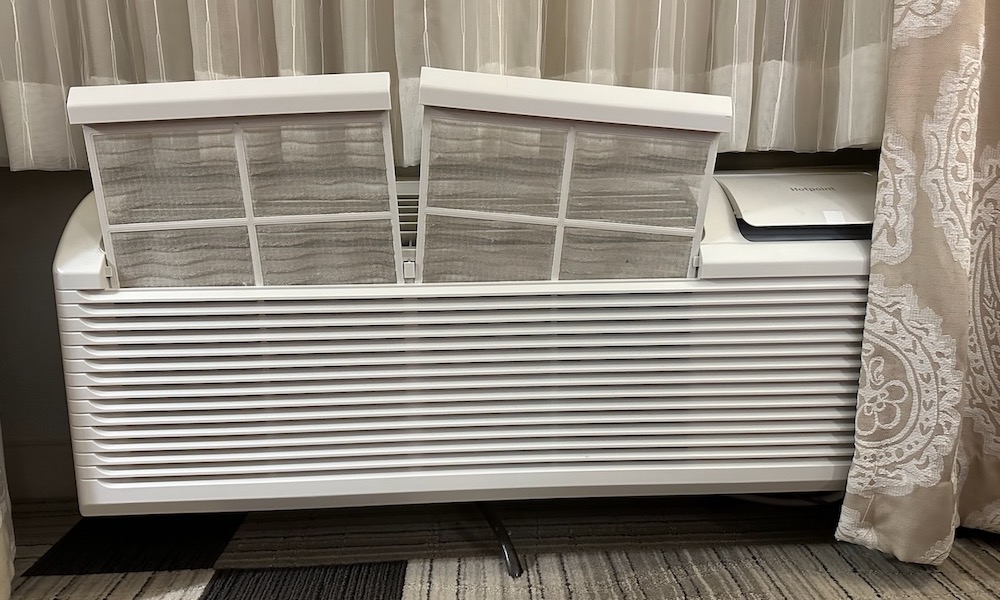
Now, remember I mentioned a question you may not have known you had? The graph below, plus what I said earlier about my first three nights, shows what I was alluding to.
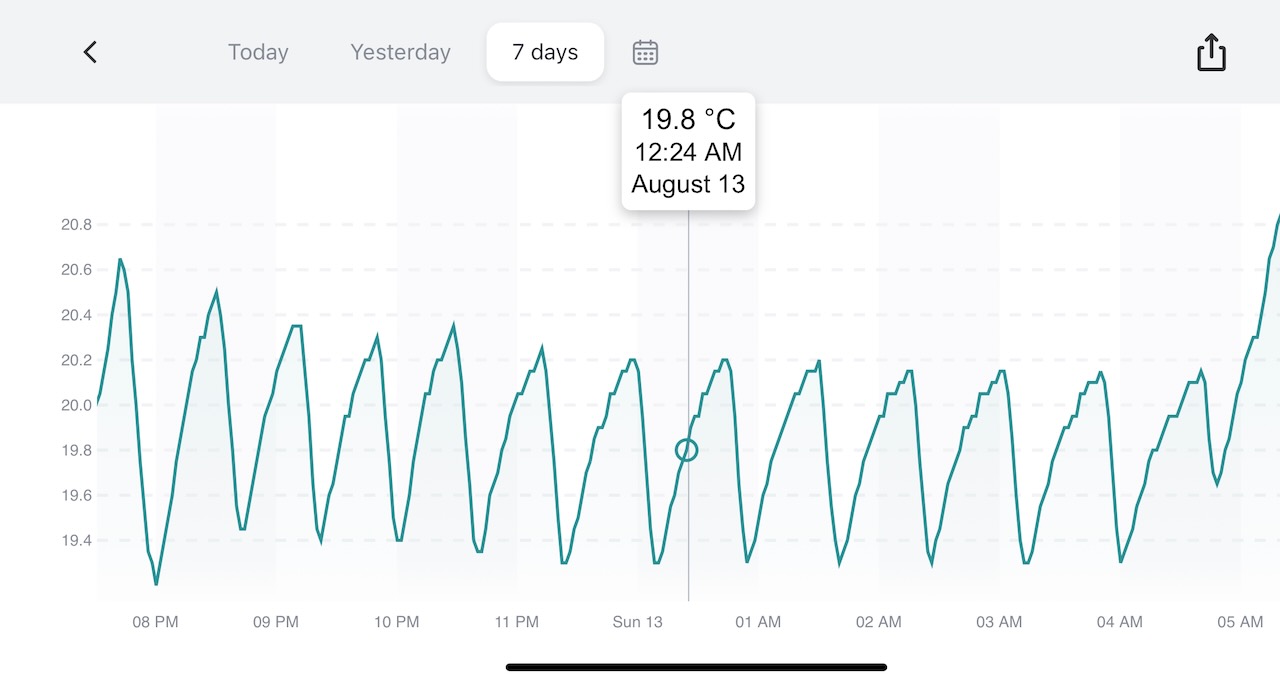
As you can see, the temperature in my hotel that night ranged from 19.3 °C (67 °F) to 20.6 °C (69 °F). That’s about what my rooms were on the first three nights of my trip. It’s pretty darn chilly. By making the room so cold, though, the air conditioner keeps wringing more moisture from the air. The dew point temperature was 51 °F (10.5 °C).
And that question of yours was, “Why do hotels keep the rooms so cold?” Right? Now you know.
What’s the problem with cold rooms and high humidity?
First, there’s the comfort problem. Keeping the temperature at 68 °F (20 °C) isn’t comfortable for a lot of people. And if the humidity is still high, you feel cold and clammy. But then you raise the thermostat setpoint, and the room starts to feel warm and sticky. It’s hard to find a middle ground that’s comfortable.
![Mold growth on the backside of drywall on an interior wall in a hotel [Photo courtesy of Chris White]](https://www.energyvanguard.com/wp-content/uploads/2023/09/mold-growth-microbial-infestation-hotel-interior-wall-high-humidity.jpg)
Also, by keeping the room so cold, the chance of humid outdoor air leaking into the building and finding cold surfaces increases. That’s what happened in the photo above. Chris White, an engineer in Louisiana who does a lot of mold and asbestos work, took this photo of an interior wall in a hotel. The back side of the drywall is covered with mold for this very reason.
So yeah, the humidity problem that hotels have has real consequences.
How can hotels fix their humidity problem?
To fix the high humidity problem, hotels need to get serious about the building enclosure, ventilation, air conditioning, and dehumidification. It starts with the building enclosure because the first step is to reduce the amount of humid air infiltrating into the rooms.
That begins with airtightness but also includes ventilation. Why ventilation? Because most hotels have exhaust-only ventilation in the bathroom. When the fan pulls air from the room, other air has to come in from somewhere to replace it. I know of at least one hotel (the Hyatt Regency in Seattle) that has dedicated makeup air. (Read about it here.) Most, however, rely on infiltration.
They also can choose an air conditioner that has good moisture removal capacity. The one in my room on the last night clearly was able to remove a lot of moisture. And it needs to have the air flow set correctly to slow down the air, making the coil colder and removing more moisture.
Finally, they need to consider supplemental dehumidification. There will be conditions when the above measures just aren’t enough.
Sum and substance
Hotels have a humidity problem. I would love to check into a hotel in summer in the eastern part of North America and not have to choose between cold-and-clammy or cool-and-sticky. I’d like not to worry about the indoor air quality problems resulting from that humidity. What’s it going to take to get them to fix it?
But there is one thing I can be happy about. At least I didn’t see anything as bad as the air conditioner in that hotel in Mississippi a decade ago.
________________________________________________________________________
Allison A. Bailes III, PhD is a speaker, writer, building science consultant, and the founder of Energy Vanguard in Decatur, Georgia. He has a doctorate in physics and is the author of a bestselling book on building science. He also writes the Energy Vanguard Blog. For more updates, you can subscribe to the Energy Vanguard newsletter and follow him on LinkedIn. Images courtesy of author.
Weekly Newsletter
Get building science and energy efficiency advice, plus special offers, in your inbox.





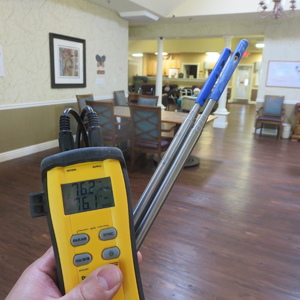
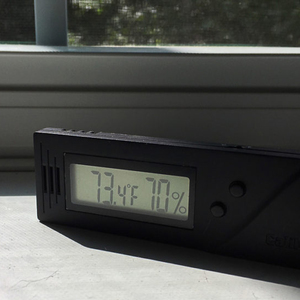
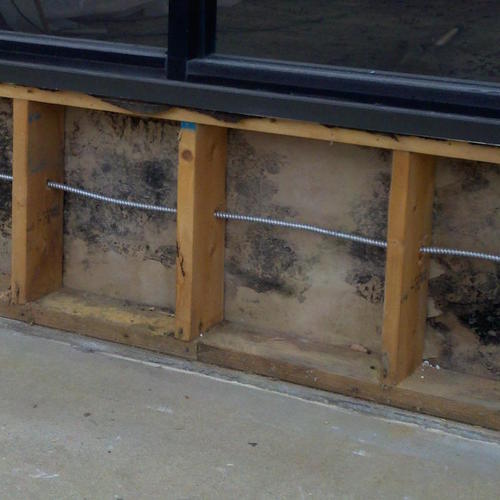




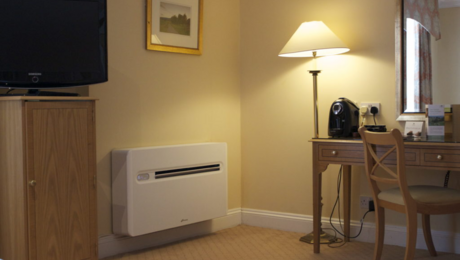


3 Comments
I grew up as an army brat - have lived all over in the US and many foreign countries
- can't even guess how many hotels I've stayed in over the years. All this time I
never realized that I'm not properly seasoned - I've never owned a hygrometer.
However, I agree wholeheartedly with the thrust of your article - hotels in the eastern
half of the US generally have humidity (and other) problems. Just out of curiosity,
what's your opinion of the efficiency of those large, through the wall, heating and
conditioning units, like the one pictured. Do any actually have heat pump technology
these days or are they all just an air conditioner with attached resistance heating?
I stay in a lot of hotels, and I'm always amazed at how many of them have no bathroom ventilation. None.
Not malfunctioning ventilation, which is also common, I'm talking about bathrooms with no grills or ventilation fixtures at all.
Usually I'm just happy if the PTAC doesn't rattle and clatter, and if the PTAC fan has a proper auto mode where it shuts off if the unit isn't actively conditioning. And if the shower head acts like a shower head.
“[Deleted]”
Log in or create an account to post a comment.
Sign up Log in